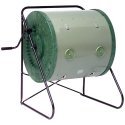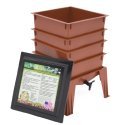What is Compost Tea?
For those who love gardening, compost tea is a wonderful way to achieve riper, more lush and tasty vegetables. Compost Tea involves using compost as if it was just that, a tea. Note, however this does NOT mean, dumping buckets of rainwater over any kind of compost and expecting to extract a perfect, environmentally friendly, oxygenated, death to bad news pathogens garden warrior spray. No, compost tea is a gentle and ethical procedure that takes some care and knowledge. Composting properly to extract compost tea is an art, and requires proper timing, and choices of compost.
Once in the early part of the 1600’s, when the renegade Japanese samurai, Myamoto Musashi survivor of the battle of Sekigahara, first went to challenge one of the countries most revered samurai warriors to a duel to the death, he did not expect to be welcomed with a traditional tea ceremony. This was unheard of. Tea? Cultivating tea is an ancient tradition, and so is gardening. The feudal samurai lord who received Musashi was also a master in the art of cultivating different kinds of tea. His garden was impeccable. So was his tea. Not surprisingly, he used compost tea to keep the garden that way. Compost tea cared for in the same way as a samurai polishes his katana, or develops his technique is an easy thing to achieve. The kinds of compost that can be used will depend on the variety of compost tea being produced. Compost tea was written about in the using of agricultural development by the roman soldier/orator Marcus Porcius Cato (234 - 149bc) who advocated the use of many different kinds of compost tea for different purposes.
Compost tea is used to enhance the productivity of beneficial microorganisms, such as bacteria and fungi, that do decomposing, protozoa and benefic nematodes that are predators. By composting 25 percent high nitrogen wastes, 30 percent wood stuffs, and 45 percent green materials, a high in benefic bacteria compost tea can be made for example. Timing is also important, compost tea needs to be properly cared for, in certain stages of its development in order to achieve the proper tea. If worm tea is to be achieved, then worm compost must be used, in which case a tray collects the moistened worm compost over a long period of time. Using a thermophylic composting system requires a good knowledge of what kind of compost material is being used and the current temperature at any given time. If for example the temperature in a given thermophylic compost reaches 135 degrees F, that’s enough for killing off all the bad news pathogens, but if the temperature goes above 160 degrees F. then benefic microorganisms start dieing off, and that’s not good. So timing is as important as the ingredients.
Another interesting part of compost tea is air, or rather oxygen, itself. Benefic microorganisms need to breath, or else they die, in which case the gardener will know that his faithful troops have succumb to the enemy by the bad smell coming from the compost tea. Compost tea should not smell bad. If it does its because the troops are being suffocated and left with no air to breath. This can be avoided by maintaining the aeration of the compost tea. If using a large compost pile, buckets of water a hose and a pump, then plan on taking some time at this. Worm tea however is much simpler. Just dampen the surface of the compost bed until drops of fresh compost tea drip into a tray. This procedure can be done with cured compost piles as well, but they must be well cured, and the water MUST be as pure as possible. If it’s full of chlorine, it needs to be oxygenated like an aquarium for at least an hour, or else those microorganisms will die from the chlorine. Rainwater can be used efficiently if it’s clean and non-toxic.
Making compost tea from a fully cured pile, means brewing tea, in which case clean water as mentioned above is needed that is well oxygenated, some molasses, and about half a bucket of the well cared for and cured compost, should get the tea started. Pour the water into the bucket, about three aquarium bubblers and a pump, and stir a couple of times a day. Bacteria just love molasses. And once the compost tea is brewed, it can be strained, sprayed immediately on that wonderfully kept garden that would make the most ancient of meditative samurai warriors proud.





